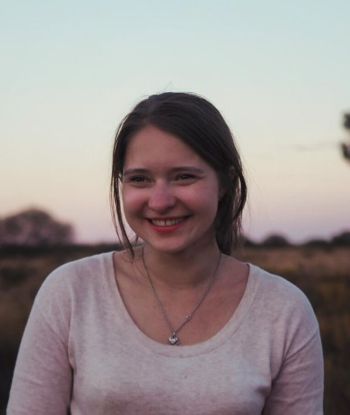 Mariya Stepanova graduated in 2020 with a degree in Biomedical Health & Life Sciences from the UCD School of Medicine. She was awarded the Medical Traineeship in Physiology, which allowed her to pursue her PhD - while simultaneously working for the UCD School of Medicine. During this period, Mariya taught histology and ran practical sessions for graduate and undergraduate medicine students. In 2025, Mariya completed her PhD in Inflammatory Bowel Disease and currently works as a researcher in neurodegenerative disease.
Mariya Stepanova graduated in 2020 with a degree in Biomedical Health & Life Sciences from the UCD School of Medicine. She was awarded the Medical Traineeship in Physiology, which allowed her to pursue her PhD - while simultaneously working for the UCD School of Medicine. During this period, Mariya taught histology and ran practical sessions for graduate and undergraduate medicine students. In 2025, Mariya completed her PhD in Inflammatory Bowel Disease and currently works as a researcher in neurodegenerative disease.
What inspired you to pursue a career in Biomedical Health & Life Sciences?
My interest in science developed in school and from then on, I knew that I wanted to continue building on this passion with a science degree. To be honest, I didn't know which science degree to do at first - there were so many specialisation streams: cell biology, pharmacology, immunology...to name but a few. But I did know that I wanted my degree to help me better patient health. This required me to have a deep understanding of all of these separate disciplines - since, at the end of the day, they are part of a whole when it comes to developing new therapies for diseases. Because BHLS blended both science and medicine, I knew it was the course for me.
What was your favourite part of studying BHLS at UCD, and why?
My favourite part was the diversity of subjects and the strong practical component to them. There was never a boring day. We had science labs, anatomy labs, computer-aided histology sessions where we looked at human tissue under the microscope. By the time I finished my degree, I understood how the body worked at the cell, tissue and organ level and how they are changed by disease.
What advice would you give to someone considering a degree in BHLS?
I would say that the degree is challenging but highly rewarding. You are exposed to such a wide range of subjects that you are bound to find your passion.
What were some of the highlights of your time at UCD?
During my PhD, I had the incredible opportunity to run histology and clinical practical sessions for the UCD School of Medicine. I found teaching students to be highly rewarding, and I look back to that time fondly.
But what made my time in UCD particularly memorable is of course the amazing friends that I met while studying. I remember the coffees and long chats by the lake during those warm sunny days.
In what ways did your BHLS education at UCD help prepare you for your role as a Researcher?
I would say that the strong practical elements of the degree really prepared me for a career in research. We had so much laboratory experience, as well as a 12-week research project in 4th year. Because of this, when I started my career in research, I was more prepared to handle the challenges that arise in my role.
Tell us more about your area of research (in layman’s terms!)
During my PhD, I was trying to increase gut healing in patients who have inflammatory bowel disease (i.e. Crohn’s disease and ulcerative colitis). After finishing my PhD, I moved into neurodegenerative disease research - which was another area I was highly interested in. In my current role, I am trying to understand why certain mutations cause the degeneration of nerves in the spinal cord.
What’s the proudest moment of your career to date?
My proudest career moment to date is undoubtedly finishing my PhD. I had to defend my thesis in a four-hour oral exam in front of a panel of subject matter experts. Although challenging, it was highly rewarding, and I am incredibly proud of how far I have come in my scientific journey.
Who have been the most inspiring mentors or advisors throughout your journey, and how have they influenced you?
The most inspiring mentor was my PhD Thesis supervisor, Prof. Carol Aherne. She provided me with immense support during my PhD, which allowed me to develop as a scientist. Another big influence on me was Prof. Cormac Taylor - who gave me invaluable advice and guidance during my PhD journey.
What’s the best piece of advice you’ve ever been given?
“Slowly but surely.”
Scientific research takes time and patience. There were times at the beginning of my PhD when I wanted to do everything at once and achieve lightning-fast progress. It took this piece of advice to help me slow down and approach my work with a consistent and sustainable manner, ultimately leading to stronger results.